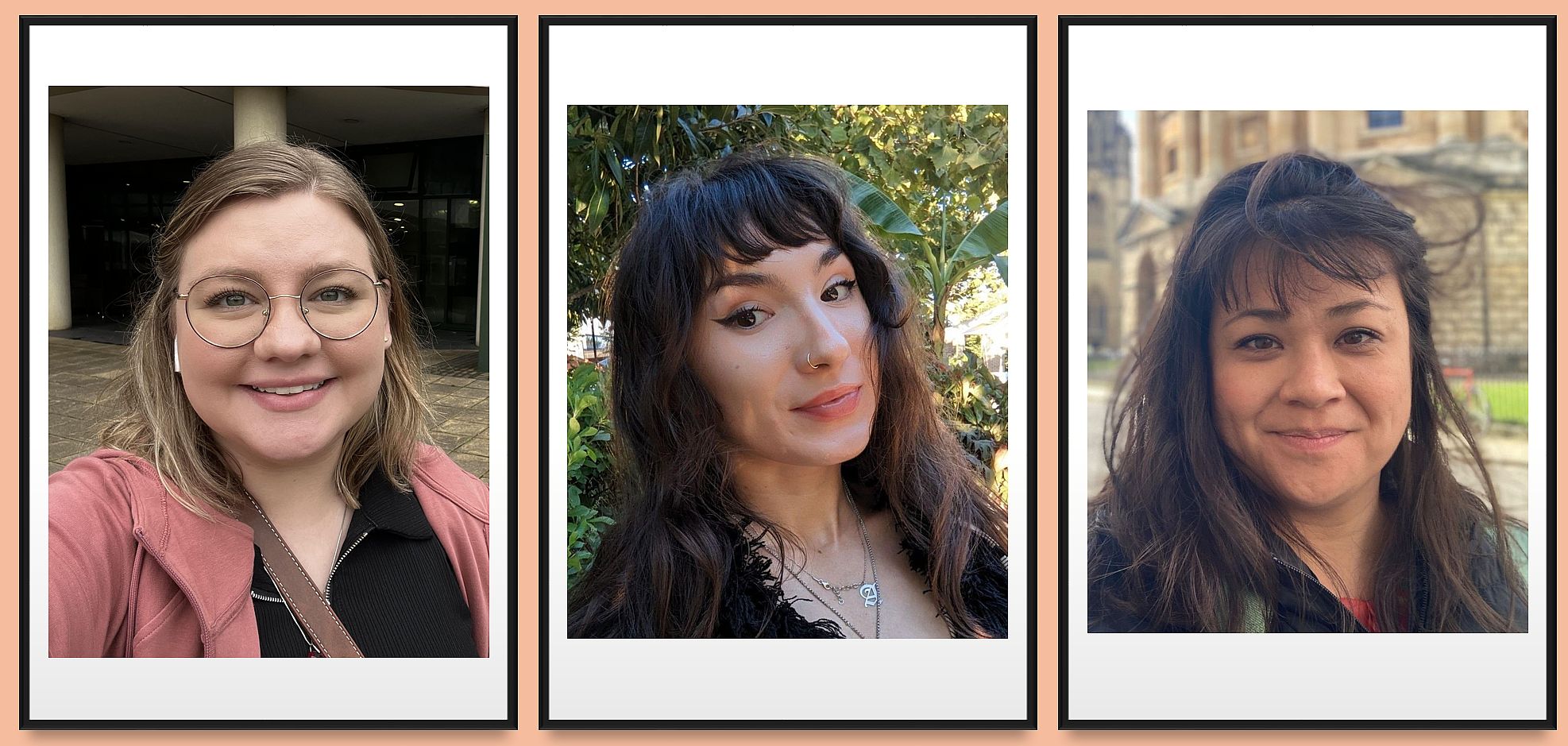
(l-r: Mikkaela Bailey, Alexis Howlett, Michaela Granger)
The Department of History congratulates three of its graduate students – two current, one recent – on their being named recipients of distinguished awards from major scholarly organizations.
Mikkaela Bailey, a student in our Ph.D. program currently in dissertation phase, has been granted a 2025 Schallek Award, jointly bestowed by the Medieval Academy of America (the most distinguished scholarly organization in North America supporting medieval studies) and the Richard III Society (which sponsors research into the life and times of the 15th-century king, and more generally into late medieval English history). The grant will support Mikkaela’s forthcoming research trip to the United Kingdom for her dissertation in progress entitled “Belonging and Belongings in Medieval East Anglia: Parish, Guild, and Society, 1350-1530”, which examines the material culture of parish guilds and confraternities in rural communities and small towns. Part of her work during that trip will be further documentary research in archives, but a major focus will be to examine the surviving physical remains of buildings and other structures associated with guilds.
Mikkaela says: “Many of these communities still boast the medieval parish churches, bell towers, and even guildhalls that have often been preserved through their multipurpose function. Exploring more closely the physical space and the spatial connection between the guild and the parish, the saints’ altars and the guildhall, and relative size (and therefore influence) of the historic buildings as they would have stood amongst homes, businesses, and civic structures. Having the opportunity to visit these in person with the support of the Schallek Award will allow me to photograph unique or significant features, take accurate measurements, and record other elements such as the contrast between structure and landscape that one can only truly grasp when viewing such a sight in the flesh.”
Alexis Howlett, currently studying in our joint M.A./M.S.L.I.S program in history and in library and information science, has received the annual scholarship jointly awarded by the Bibliographical Society of America (BSA) and the Rare Book School (RBS), both dedicated to fostering research in the history of books and manuscripts. The scholarship will enable Alexis to take one or more specialized RBS courses in the near future.
Alexis says: “Receiving the Bibliographical Society of America Scholarship to the Rare Book School represents an opportunity for me to deepen my understanding of medieval and early modern material culture – interests that have both developed and flourished during my time in the history program. As the Special Collections Technician at Catholic University, my duties mostly involve our more modern archival materials, although I seize any opportunity to work in our campus’s rare book library. This RBS scholarship will provide me with a focused and intensive learning/working experience in manuscripts and early printing. I’m always seeking new ways of improving my knowledge in the intersections of both my programs in late medieval to early modern history and library science. Securing an RBS scholarship has been one of my primary goals since moving to the DMV area. I’m incredibly grateful to have been selected! I currently have my eyes on the ‘Medieval Manuscript Fragments: Cataloging & Discoverability’ course which ‘[incorporates] paleography, codicology, liturgiology, musicology, textual studies, art history, bibliography, provenance, and digital humanities, among other disciplines’ or the ‘Textual Mobilities: Works, Books & Reading Across Early Modern Europe’ course which ‘considers [the] histories of books, texts, and reading using the lens of connected history’.”
Michaela Granger (Ph.D. 2024), professor of history at Raritan Valley Community College in Branchburg, NJ, has been awarded the Hagiographical Studies Travel Award for 2025. The award is a grant from the Hagiographical Society, whose mission is to promote communication among scholars studying holy people and their cults in all eras, cultures, and religious traditions. The Society has instituted this award in recognition of the decreasing levels of funding available to scholars, and its intention is to make this an annual grant.
The award will enable Michaela to present “Holy Mothers of the Iberian Peninsula: A Comparative Approach”, on the panel “Holiness in the Medieval Mediterranean” at the 2025 International Congress on Medieval Studies, which will take place on 8-10 May in Kalamazoo, MI.
Michaela says: “I am delighted and honored to have received the Hagiographical Studies Award this year. As an early career scholar, it was not financially feasible for me to participate in all the conferences and workshops I had hoped to this year with my limited expendable budget. Thanks to this award, I will be able to travel to the International Congress of Medieval Studies in person, rather than online, in 2025. I am confident that in-person attendance will afford me the opportunity to connect and collaborate with other scholars in my field to a level that would not be possible if I had given my paper online.
“The paper I will be giving draws on part of my dissertation research, specifically the sections on three Iberian mother-saints: Elizabeth of Portugal (1271-336), Juana de Aza’s (c. 1190), and Maria de la Cabeza (d. 1175). In the paper, I suggest that factors specific to the Iberian context, such as their position on the periphery of Latin Christendom and their identity as a newly “reconquered” Christian polity, allowed for greater flexibility in allowing mothers with children to be recognized as saints. I look forward to presenting this research at ICMS 2025 to other members of the Hagiography Society and the wider scholarly community.”
